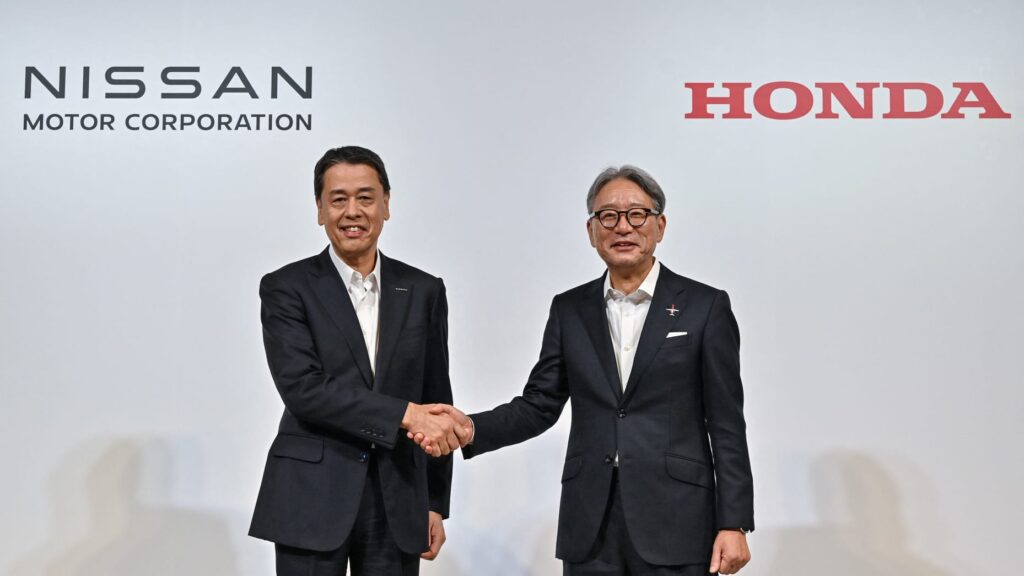Honda and Nissan in merger discussions

Honda and Nissan are currently engaged in discussions about a potential merger, a move that could bring together two of Japan’s most prominent automakers, both of which have recently faced significant challenges. Although the companies confirmed the ongoing talks, they refrained from providing specifics regarding the potential deal’s timeline, structure, or any terms. The exact nature of the possible joint-venture, if one were to emerge, remains unclear. Nikkei was the first to report this potential merger on Tuesday.
In a statement issued on Tuesday, the companies mentioned, “As announced in March, Honda and Nissan are exploring various possibilities for future collaboration, leveraging each other’s strengths.” They further emphasized that they would provide updates to stakeholders when appropriate. The companies also revealed to CNN that Mitsubishi, another major Japanese automaker, is part of the early-stage discussions, potentially adding a third key player to the mix. Mitsubishi, however, did not respond to requests for comment regarding these talks.
The potential merger comes after Honda and Nissan initially announced in March that they would collaborate on electric vehicles (EVs), with the two companies later extending their cooperation in August to include battery technology. As both companies continue to face numerous hurdles, particularly in the highly competitive and rapidly evolving electric vehicle market, their partnership could offer significant benefits. Strengthening their ties could provide a necessary boost, given the mounting difficulties both manufacturers are experiencing.
One of the primary challenges both Honda and Nissan have encountered is in China, the world’s largest automotive market. Historically, foreign brands enjoyed strong sales in the country, but over recent years, Chinese consumers have increasingly favored domestic brands due to their better perceived value and competitive pricing. Additionally, the Chinese government has implemented policies to encourage the adoption of electric vehicles and plug-in hybrids, benefiting local companies such as BYD, which has surpassed the technology of both Honda and Nissan and offered these vehicles at lower prices. Despite both companies offering their own EVs and plug-ins, including Nissan’s pioneering efforts in electric vehicle technology, the Chinese market has proven difficult for foreign automakers to maintain their market share.
Further complicating matters for Nissan is the aftermath of the scandal involving its former CEO, Carlos Ghosn. Ghosn, who was arrested in Tokyo in 2018 on charges of financial misconduct, fled Japan to Lebanon, where he remains a fugitive. His ousting from the company caused major disruptions within the automaker’s leadership and eroded the strength of the once-powerful alliance between Nissan, Renault, and Mitsubishi. Following Ghosn’s departure, Renault sharply reduced its ownership stake in Nissan, weakening the Japanese company. In addition to the leadership crisis, Nissan reported a staggering 90% decline in operating income for the period between March and September compared to the same timeframe the previous year.
Honda, despite being approximately five times larger than Nissan, is not immune to its own set of challenges. The company has set ambitious goals to only sell zero-emission vehicles in major global markets by 2040. However, the transition to electric vehicles has been slower than anticipated. Factors such as relatively low gas prices, insufficient EV charging infrastructure, and increasing competition from both traditional automakers and new entrants to the electric vehicle market have all contributed to slower-than-expected adoption in markets such as the United States and Europe. These challenges are particularly significant as Honda works to transform its business model in a rapidly changing automotive landscape.
With both Honda and Nissan facing difficulties in the global automotive market, the potential merger represents a strategic attempt to pool their resources and expertise in order to better compete in an increasingly competitive and volatile market. As both companies continue to grapple with these issues, the outcome of their talks will likely have far-reaching implications for their future operations and the global automotive industry as a whole.
